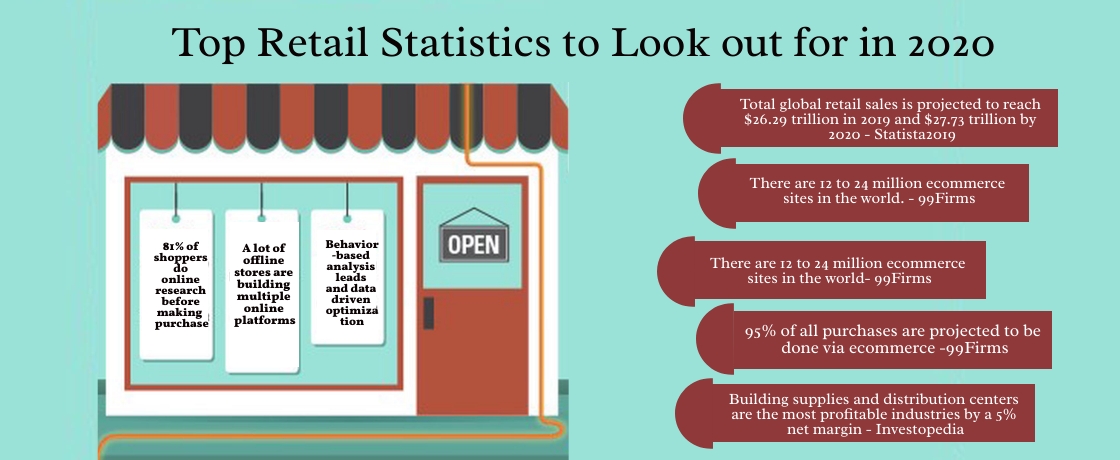The retail industry is one of the fastest-growing business sectors. It has potential to cope up with the ever-rising customer’s demands and expectations. Some people think that retail industry is becoming obsolete day by day. But that’s not the case; the future is bright for the retail sector; and it is evolving day by day.
Being a retailer, you need to think of having a significant investment in technology. And technologies including machine learning, artificial intelligence, and big data will enable you to keep up with the competition.
Have you ever wondered what artificial intelligence can offer to your retail business? Artificial intelligence can enhance fast and effective customer experience and improve customer interaction, too. A lot of recognized brands including Amazon and Walmart are big fishes in the market but are still investing in technology. That’s why being a Retailer, you need to think of investing in technology, which in turn, will help you in strategizing on how to eliminate slow innovation and satisfy your customer’s business needs.

When retailers join forces to share knowledge on data and analytics, they tend to gain a competitive advantage. But do you know how will we achieve successful data and analytics transformation? This article will give you in-depth details on how you can create a favourable retail ecosystem by leveraging data and analytics. Keep reading.
Creation and identification of client’s profiles
Being in the retail industry, you need to understand customers’ behaviors by analyzing their purchasing habits. This will help you in identifying your customers’ needs and helping them with quality products.
Retailers are using data-driven social media platforms, basket analysis, transaction history, and online surveys to analyse their customers’ buying habits. By analyzing customer’s habits, retailers can offer products based on their past preferences or what other customers are purchasing.
Enhanced customer loyalty
Since recent times, Customers want their retailers to treat them with devotion. They want you to understand their buying requirements, have products and services that they need, and update them on products available. But for retailers it has become a daunting task considering the number of customers they handle. As every customer has different preferences.
To meet this challenge analytics has emerged as a savior. As an efficient analytics will help you in recommending the right products that are in demand in the market or spot out a gap in the market that needs to be filled.
It helps in understanding the buying patterns of customers. It is crucial when you want to follow your customers at every step of the Sale cycle. And now it has become a must-have strategy for retailers to thrive in a competitive market.
Demand prediction
Forecasting demand is a trend that you need to include in your strategy to find products that will be in demand at a specific time of the year, place, or at target groups.
Let’s see how will demand forecasting impact your business?
Forecasting will enable you to plan your inventory and stock. Social media plays an important role in forecasting the buying needs. As it helps in gathering data from social media, which in turn, helps in understanding the changing preferences of your customers. Social media has become an important tool for monitoring the trend in the industry and get instant feedback from the customers.
Price optimization
Data analytics is the key tool for price determination. As price of a product depends on several factors including competitive pricing, market demand, and seasonal merchandise, etc.
Analytics follow request and competitors’ activities and give a response to market changes in real-time. And this allows retailers to respond appropriately based on the information presented. Gone are the days when retailers used to drop the prices of products when demand is low. Now based on the data available, prices are adjusted accordingly. And available offers are sent to customers who frequently purchase the product.
As a retailer, you have to adopt an appropriate analytic strategy for the success of your business. A successful analytic strategy will affect areas of business operations, namely product, marketing, supply chain, and store operations.
Product analytics
Product analytics is crucial as it helps you to stock the right product at the right time. The retailers can make decisions as per the customers’ expectations. This product analytics help retailers in identifying attributes that are the key to the customers- brand, package size, or flavor. Product analytics will help you to forecast the demand of a product based on an attribute.
Marketing analytics
Do you have a strategy to keep up with your customers’ needs? Marketing analytics gather information from various sources including loyalties cards, customer feedback systems, etc., and combine it with social media data to perform analysis to help the retailer make marketing decisions. And this analytics improves marketing effectiveness.
Supply chain analytics
How do you monitor the operations of your business? Analytics can help you keep track of the movement of your fleet, and understand the conduct of your drivers, etc. This will create safe and efficient logistics and reduce overall operating costs.
Store operations analytics
Imagine monitoring the flow of your customers by a click of a button? Investing in location analytics, makes that possible. It helps you to map the area receiving several customers in different business hours. Location analytics will make re-stocking automated.
Conclusion
Retailers will continue to thrive if they adopt data management and a well-structured analytics approach. This will help them understand what their customers expect, how the operations of the business are progressing, and much more. Data management and analytics have continuously evolved to its present state. As a retailer, you should understand and implement data analytics for a favorable retail ecosystem. For being a successful retailer, you should change with changing Internet needs and get connected with the whole world. The future is bright for retailers with advanced data and analytic strategies.


